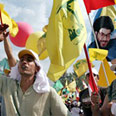
‘Fearful Arabs’ slammed
Harsh op-ed signals growing Arab world’s concern about Hizbullah
While the quiet returns to Beirut’s streets, after what was defined as the “Hizbullah coup” in Saudi media outlets, the Arab media is starting to recognize Iran as a problem threatening the stability of regional regimes. An astounding article to that effect was published recently by the editor in chief of Arabic-language newspaper al-Sharq al-Awsat, Tariq Alhomayed, under the headline “Iran and the fearful Arabs.”
“Amidst the political classification in the region and talk of the moderate and extremist states, other states seem to have been overlooked – and they are the states that deserve to be called the 'fearful Arab' states,” he wrote. “The fearful Arab states…are the ones affirming, without conviction, that the Lebanese crisis is an internal matter and they are calling against confrontation with Iran. The fearful Arab states are unaware of the fact that the conflict with Iran will prevail and that it will not just end in Beirut.”
Alhomayed’s article resonated throughout the Arab world and also provoked great anger against him in Iran. However, a few days later, when the Siniora government capitulated vis-à-vis Hizbullah, Alhomayed was quick to write another op-ed, analyzing the winners and losers of the events in Lebanon, under the headline: “Hizbullah’s defeat.”
“If the events in Lebanon today are perceived in accordance with who won and who lost, then the answer is undoubtedly Hizbullah and its leader Hassan Nasrallah are the losing party,” he wrote. “Hassan Nasrallah and his party were defeated the day the divinely-guided leader lost his credibility on the Lebanese street and before the Arab and Islamic worlds. It makes no difference how much he pledges today or tomorrow; the Arabs, Muslims and Lebanese will never forget how Hizbullah turned its weapons against its own people after numerous vows that it would only use them against Israel.”
Nasrallah’s veto power
In the short-run, there is no doubt who won – Hizbullah, and behind it Syria and Iran. After a week of armed clashes that reminded everyone in Lebanon the terrible sights of the civil war, Nasrallah managed to force the Lebanese government to agree to all his demands – namely, annul two decisions it took: Firing a senior security officer at the Beirut airport and interfering with Hizbullah’s communication network. The implication is that from now on Nasrallah has a practical veto power on government decisions. He has already proven that he can change decisions that are not to his liking.
However, after Hizbullah’s show of force, it is unclear whether such decisions would even be taken. Who would want to take the risk? So for the time being, Nasrallah gained senior status in the Lebanese political system, without carrying the official title of prime minister or president, and without bearing the responsibility inherent in such post. We are therefore dealing with an “unofficial coup” or a “semi revolution,” and if that is the case, it is uncertain whether Nasrallah should even strive to carry out a full-blown coup. If he affects decision-making as it is, why should he bear the official responsibility for the needs of all Lebanese?
Yet this is only the interim result. In the long run, it is not at all certain whether Nasrallah won. After all, he used the weapons he swore to direct only at Israel within Lebanon. From now on, as Alhomayed wrote, nobody will ever forget this. Nasrallah also managed to bring the camp opposed to him even closer. This camp includes the Sunnis, the Christians, and the Druze. All of them will not quickly forget what happened in Lebanon this past week, while waiting for the right time to settle the score.










